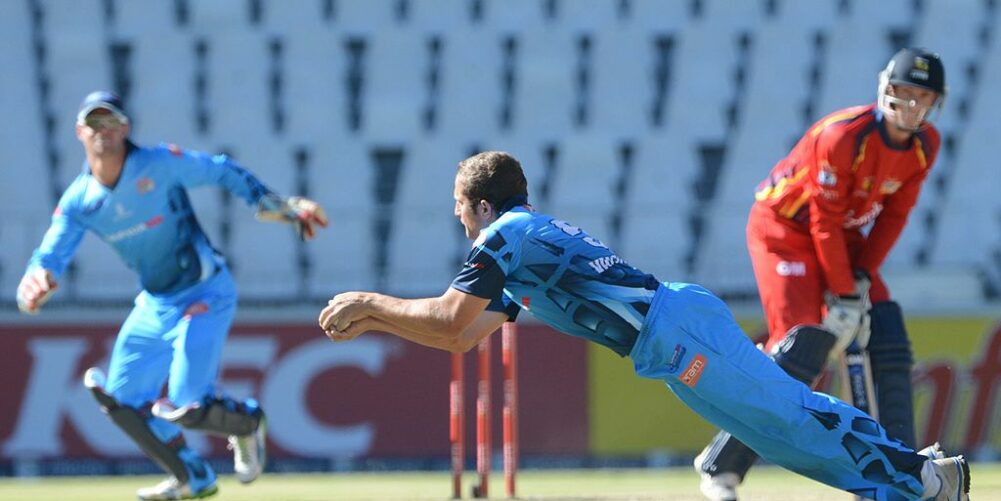(Photo: Lee Warren/Gallo Images/Getty Images)
By Neil Manthorp
It wasn’t necessary to watch South Africa’s insipid performance in the first T20 on Wednesday to know they aren’t very good at the format. Their record over the last decade could have told you that.
Despite such luminaries as AB de Villiers there isn’t a great deal of interest in T20 internationals back at home – at least, not the results. Sure, they are well attended, but on the same basis as a pub with a good reputation for live music on Friday nights.
South African interest in the ongoing T20 series has been well and truly hijacked by Monday’s announcement of the owners of the eight franchises in the inaugural Global League, which starts at the beginning of November and ends on December 16. The IPL and the Big Bash are well watched in the Republic and the prospect of having their own party has made people very excited.
Cricket South Africa clicked its collective, executive fingers fewer than six months ago and their determination to board the domestic T20 party bus has been moving at a ferocious pace ever since.
Concerns that it was developed too quickly are legitimate, that the financial infrastructure would not be strong enough to support the vast initial outlay on investment, that too much smoke and too many mirrors were involved are legitimate…but the enormity of the potential reward justified the risks.
On Monday, in London, to the understandable dismay of both the ICC and the ECB (who kyboshed the original launch scheduled for Lord’s and banned Jason Roy and Eoin Morgan from attending the subsequent function at a hotel in Knightsbridge) the Global League took its most important step towards reality with the announcement of the eight franchise owners whose successful bids were pitched at between $25 and $35 million.
Shah Rukh Khan became the first ‘Super Franchise’ owner with the establishment of the “Cape Town Knight Riders” to go with the Kolkata and Trinbago versions of the team and now, effectively, has four months of global cricket exposure to offer the sponsors of the team – or brand.
The franchise is now in a position to offer annual contracts to some of its players which would dwarf anything any of the national boards, apart from India, England and Australia, could offer even their most elite players.
The trend in cricket is obvious. The Delhi Daredevils also added Jo’burg’s Wanderers franchise to their stable with the Pakistan Super League’s Lahore and Peshawar consortiums also spreading their wings into the South African market.
The establishment of the Global League will be remembered in future as the ‘tipping point’ at which the game moved inexorably towards the world-wide soccer model in which players are contracted to clubs and only released to their countries for tournaments such as the African and European Champion-ships and World Cup.
In the case of cricket they would be the ICC events – T20 and 50-over World Cups. Bilateral series between nations in either ODI or Test formats will become squeezed to the point of virtual non-existence. What will be especially interesting is to see how the Ashes survives in this increasingly barren landscape, like a magnificent cathedral that somehow escaped a wartime carpet bombing.
If the major Test playing nations and the ICC are unhappy about the death of their ‘old world’ and the formation of the new one, they have only themselves to blame.
For more than a decade they have procrastinated, argued and failed to agree on the formation of leagues – and prize money – for both formats which might have provided context, meaning and motivation for players around the world.
Unlike Cricket Australia, CSA could not afford to go the ‘private route’ with the Global League. The Rand is simply too weak and unstable to provide sufficient funds and guarantees to attract the best players in the world and to maintain the levels of technical expertise to keep the show on the road.
So, like the IPL and the Caribbean Premier League, teams have been sold to individuals and consortiums on a ten-year lease. Although they have been asked to bear South Africa’s ‘transformation’ and selection goals in mind, and have agreed to do so, they are running a business first and foremost and will naturally prioritise a return on their investment.
By including two IPL teams and two from the PSL, they have all but guaranteed television broadcast deals in two of the biggest and most lucrative markets in the world.
There is much, well-intended talk of the benefits that will befall local cricketers and the economy as a whole from the injection of cash these wealthy owners will provide.
In theory, England may benefit, too, because the Global League will provide the financial incentive to dissuade the country’s best players from pursuing Kolpak contracts in this country.
When South Africa hosted the IPL for a season almost a decade ago, the energy and the buzz it provided was infectious.
But there were also many decent, honest, long-serving cricket people who felt it was more of an infectious disease as the stadia were stripped naked and redressed in unfamiliar robes.
Hospitality boxes were taken over, patrons’ car parks reserved for VIPs and many other noses put out of joint.
There will no doubt be more of the same in the eight towns and cities chosen as venues but this time it will be for a decade.
And it won’t just be the locals. The effects of the Global League will be felt, well, globally.












